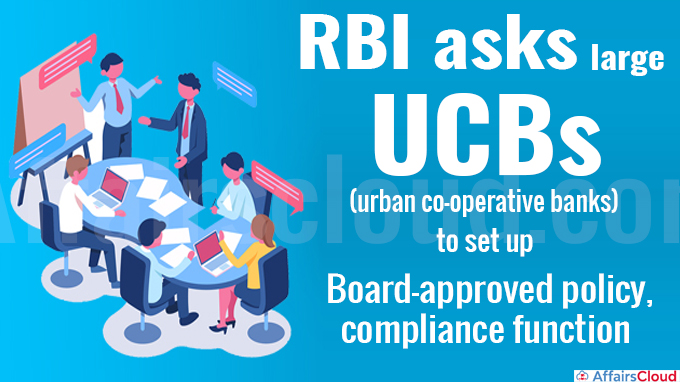
On September 19, 2022, the Reserve Bank of India (RBI) directed Urban Cooperative Banks (UCBs) belonging to tier 3 and tier 4 categories, except UCBs under All Inclusive Directions (AID), to create a Board-approved policy and compliance function.
- Under this, UCBs with more than Rs 10,000 crore deposits (tier 4 category) mandated to create same, including the appointment of a Chief Compliance Officer (CCO), by April 1, 2023 while Tier 3 UCBs i.e. those having more than Rs 1,000 crore and up to Rs 10,000 crore deposits are given the deadline of October 1, 2023.
What should be in the Compliance Policy?
i.The board approved Compliance Policy should provide a clear outline on the implementation of compliance philosophy, expectations on compliance culture, structure and role of the Compliance Function, the role of the CCO and the processes for the identification, assessment, monitoring, management and reporting on the compliance risk.
ii.The framework requires the Senior Management of these UCBs to undertake Compliance Risk Assessment every year.
iii.The Compliance Function should ensure strict observance of all statutory and regulatory requirements for the UCBs, including standards of conduct, management of conflict of interest, fair treatment of customers and providing suitable customer service.
Who is CCO?
The Chief Compliance Officer (CCO) is the head of the Compliance Department. His/Her tenure should be at least 3 years. CCO will directly report to the MD (Managing Director) and CEO (Chief Executive Officer) and/or Board or Board Committee.
- The CCO and Compliance Function will have the authority to communicate with any staff member and access all records or files required to undertake the entrusted responsibilities with regards to compliance risks.
What is Compliance risk?
It is the risk of legal or regulatory sanctions, material financial loss or loss of reputation a UCB may suffer, as a result of its failure to comply with laws, regulations, rules, and codes of conduct, etc., applicable to its activities.
Click Here for Official Notification
India’s banking system liquidity slips into deficit after 40 months
According to the Reserve Bank of India’s (RBI), India’s banking system liquidity has slipped into deficit for the first time in nearly 40 months.
- On September 20, 2022, RBI infused 218 billion Indian rupees ($2.73 billion) into banking system.
- Overnight rates continue to stay elevated, with one-day call money rate jumping to 5.85%, highest since July 2019.
Recent Related News:
i.RBI has temporarily allowed merchants or their Payment Aggregators (PAs)
involved in settlement of transactions where cardholders choose to enter the card details manually to save the Card-On-File (CoF) data for a maximum duration of “Transaction Date + 4 days” or until the settlement date, whichever is earlier.
ii.RBI has approved the Punjab National Bank (PNB) to infuse investment of Rs
500 crore in the proposed Rs.2,500 crore rights issue of PNB Housing Finance Limited (PNBHFL).The rights issue process is expected to conclude by December 2022 or latest in the March quarter.
About Reserve Bank of India (RBI):
i.The Reserve Bank of India was established on April 1, 1935, in accordance with the provisions of the Reserve Bank of India Act, 1934.
ii.The Central Office of the Reserve Bank was initially established in Calcutta but was permanently moved to Mumbai in 1937.
iii.Though originally privately owned, since nationalization in 1949, the Reserve Bank is fully owned by the Government of India.




